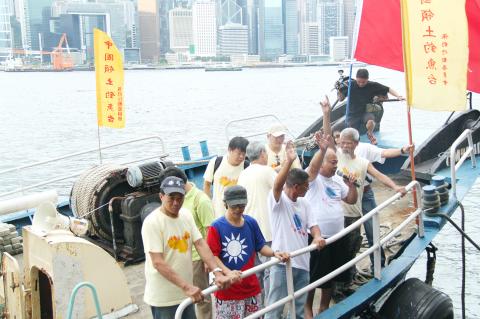Activists and government officials yesterday vowed to protect the right of Taiwanese fishing boats to operate around the disputed Diaoyutai Islands (釣魚台) and to defend the country’s sovereignty over the region.
A small group from the World Chinese Alliance in Defense of the Diaoyu Islands (世界華人保釣聯盟), an organization composed of activists from Taiwan, Hong Kong, Macau and China, joined hands in their latest move to assert Chinese ownership over the area, which is also known as Senkaku Islands in Japan.
Chinese Association for Protecting the Diaoyutais chairman Hsieh Mang-lin (謝夢麟) said yesterday that a group of six Taiwanese would rendezvous with 14 other activists led by Chan Miu Tak (陳妙德), chairman of the Hong Kong-based Action Committee for Defending the Diaoyu Islands, at sea near Pengjia Islet (彭佳嶼) off Taiwan’s northernmost tip today before heading toward the Diaoyutai Islands.

Photo: CNA
“This time we will be fully prepared and plan to land on the Diaoyutai Islands to hoist the flag of the Republic of China to maintain our sovereignty and fishing rights,” he said.
According to the Web site of the Chinese Association for Protecting the Diayutais, the Bao Diao II vessel, with 14 people on board — including Chan, activists from China and Macau, four crew members, and two journalists from Phoenix Hong Kong Channel — departed at 12:45pm on Sunday.
The Taiwanese group is scheduled to set sail from Yilan this evening in two fishing boats.
Hsieh said that move was triggered by the upcoming visit to the islands by 50 Japanese lawmakers on Sunday.
“We will act in concert with the group led by Chan to proclaim that Diaoyutai Islands belong to Chinese people,” Chan was quoted by the Japan Times as saying. “Japanese lawmakers are planning to land on the islands on Aug. 19. We want to get there before they do.”
“The Diaoyu Islands are Chinese territory. We will fight for the sovereignty of the Chinese nation,” Chan said.
Coast Guard Administration (CGA) Deputy Director-General Wang Chung-yi (王崇儀) said the agency would send coast guard vessels to escort and protect Taiwanese activists in accordance with previous practice.
“As long as the activists meet regulations that forbid the carriage of items of dangerous goods onto a ship and the weather permits, we have no reason to stop fishing boats from setting sail to Diaoyutai Islands,” Wang said.
Ministry of Foreign Affairs spokesperson Steve Hsia (夏季昌) reiterated that Taiwan has sovereignty over the Diaoyutai Islands, which are traditional fishing grounds for Taiwanese fishermen and part of its territory.
Hsia called on all parties to remain rational and practice restraint to avoid escalating tensions.

Alain Robert, known as the "French Spider-Man," praised Alex Honnold as exceptionally well-prepared after the US climber completed a free solo ascent of Taipei 101 yesterday. Robert said Honnold's ascent of the 508m-tall skyscraper in just more than one-and-a-half hours without using safety ropes or equipment was a remarkable achievement. "This is my life," he said in an interview conducted in French, adding that he liked the feeling of being "on the edge of danger." The 63-year-old Frenchman climbed Taipei 101 using ropes in December 2004, taking about four hours to reach the top. On a one-to-10 scale of difficulty, Robert said Taipei 101

Nipah virus infection is to be officially listed as a category 5 notifiable infectious disease in Taiwan in March, while clinical treatment guidelines are being formulated, the Centers for Disease Control (CDC) said yesterday. With Nipah infections being reported in other countries and considering its relatively high fatality rate, the centers on Jan. 16 announced that it would be listed as a notifiable infectious disease to bolster the nation’s systematic early warning system and increase public awareness, the CDC said. Bangladesh reported four fatal cases last year in separate districts, with three linked to raw date palm sap consumption, CDC Epidemic Intelligence

US climber Alex Honnold left Taiwan this morning a day after completing a free-solo ascent of Taipei 101, a feat that drew cheers from onlookers and gained widespread international attention. Honnold yesterday scaled the 101-story skyscraper without a rope or safety harness. The climb — the highest urban free-solo ascent ever attempted — took just more than 90 minutes and was streamed live on Netflix. It was covered by major international news outlets including CNN, the New York Times, the Guardian and the Wall Street Journal. As Honnold prepared to leave Taiwan today, he attracted a crowd when he and his wife, Sanni,

Taiwanese and US defense groups are collaborating to introduce deployable, semi-autonomous manufacturing systems for drones and components in a boost to the nation’s supply chain resilience. Taiwan’s G-Tech Optroelectronics Corp subsidiary GTOC and the US’ Aerkomm Inc on Friday announced an agreement with fellow US-based Firestorm Lab to adopt the latter’s xCell, a technology featuring 3D printers fitted in 6.1m container units. The systems enable aerial platforms and parts to be produced in high volumes from dispersed nodes capable of rapid redeployment, to minimize the risk of enemy strikes and to meet field requirements, they said. Firestorm chief technology officer Ian Muceus said